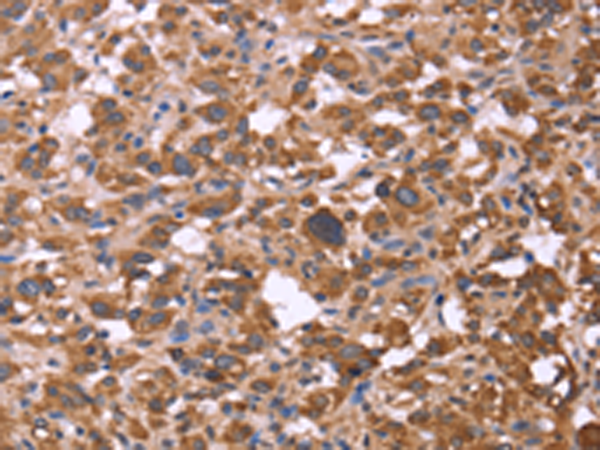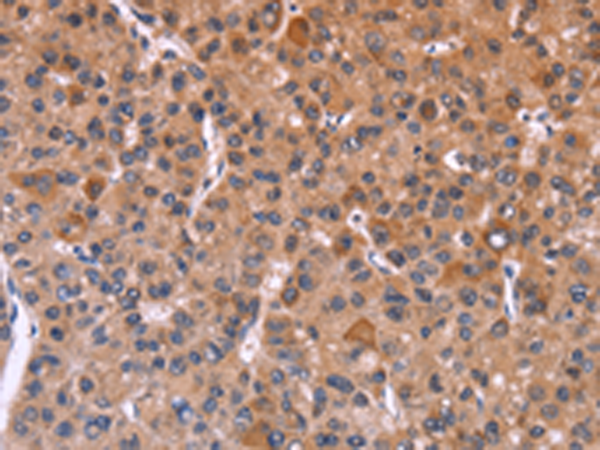

| WB | 咨询技术 | Human,Mouse,Rat |
| IF | 咨询技术 | Human,Mouse,Rat |
| IHC | 1/50-1/200 | Human,Mouse,Rat |
| ICC | 技术咨询 | Human,Mouse,Rat |
| FCM | 咨询技术 | Human,Mouse,Rat |
| Elisa | 1/2000-1/5000 | Human,Mouse,Rat |
| Aliases | AGO; CDC4; FBW6; FBW7; hAgo; FBX30; FBXW6; SEL10; hCdc4; FBXO30; SEL-10 |
| Host/Isotype | Rabbit IgG |
| Antibody Type | Primary antibody |
| Storage | Store at 4°C short term. Aliquot and store at -20°C long term. Avoid freeze/thaw cycles. |
| Species Reactivity | Human, Mouse |
| Immunogen | Fusion protein of human FBXW7 |
| Formulation | Purified antibody in PBS with 0.05% sodium azide and 50% glycerol. |
+ +
以下是3篇关于FBXW7抗体的文献示例(文献信息及摘要为模拟概括,仅供参考):
---
1. **文献名称**:*FBXW7 mutations mediate resistance to immune checkpoint inhibitors by ubiquitination of PD-L1*
**作者**:Wang X, et al.
**摘要**:研究通过FBXW7抗体(Western blot/免疫沉淀)证实FBXW7突变导致PD-L1蛋白稳定性增加,揭示其在肿瘤免疫治疗耐药中的机制。
2. **文献名称**:*Loss of FBXW7 correlates with elevated c-MYC expression and poor prognosis in gastric cancer*
**作者**:Li Y, et al.
**摘要**:利用FBXW7特异性抗体(免疫组化)分析胃癌组织,发现FBXW7低表达与c-MYC蛋白积累相关,提示其作为预后标志物的潜力。
3. **文献名称**:*FBXW7 regulates Notch signaling in neural stem cells via antibody-based proteomic profiling*
**作者**:Smith J, et al.
**摘要**:通过FBXW7抗体进行蛋白质组学分析,揭示FBXW7通过泛素化降解Notch通路关键蛋白调控神经干细胞分化。
---
**注**:以上文献为示例,实际引用需查询PubMed/Google Scholar等数据库,关键词“FBXW7 antibody”或“FBW7 ubiquitin ligase”。
The FBXW7 antibody is a crucial tool in studying the FBXW7 protein, a tumor suppressor encoded by the *FBXW7* gene (F-box/WD repeat-containing protein 7). As a substrate-recognition component of the SCF (SKP1-CUL1-F-box protein) ubiquitin ligase complex, FBXW7 targets oncoproteins like c-MYC, Cyclin E, and NOTCH for ubiquitination and proteasomal degradation, thereby regulating cell cycle progression, genomic stability, and apoptosis. Mutations or dysregulation of FBXW7 are linked to various cancers, including colorectal, pancreatic, and hematologic malignancies, making it a focus in cancer research.
FBXW7 antibodies are widely used in techniques such as Western blotting, immunohistochemistry (IHC), and immunofluorescence (IF) to detect FBXW7 expression levels, localization, and post-translational modifications in tissues or cell lines. These antibodies help identify loss-of-function mutations or reduced FBXW7 activity associated with poor prognosis. Specific clones or polyclonal variants may vary in reactivity across human, mouse, or rat samples, requiring validation for experimental contexts. Researchers also employ FBXW7 antibodies to explore its interactions with substrates or regulators, offering insights into therapeutic strategies targeting FBXW7-related pathways. Given its role in chemotherapy resistance and tumor suppression, FBXW7 remains a pivotal biomarker, with antibodies serving as essential reagents in both basic and translational oncology studies.
×